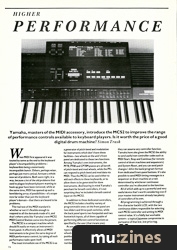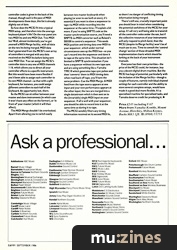Electronics & Music Maker - September 1986
|
What a difference a show makes - or further thoughts on the British Music Fair '86. |
All that's new from the world of music technology - including some new goodies that weren't at the BMF. |
More readers' news and views. If you've got a point to raise, this is the place to raise it. |
Your technical queries answered by E&MM's team of experts. |
Put two Lexicon 224Xs in one box, add a sprinkling of new features, and you have the reverb-based effects unit to beat them all. Paul Wiffen has the advance details. |
Latest digital reverb from a company that's been making outboard effects gear longer than most. Paul White gives his first impressions. |
BMF Report '86The Editor struggles through tech-laden stands, lively demos, liquid lunches and hordes of musicians to bring news of Britain's best-ever music show. If you missed it, you missed out. |
Roland RD1000 PianoHow does Roland's new SAS resynthesis system go about imitating a grand piano? Dan Goldstein digs deep inside the RD1000 and its modular counterpart, the MKS20, and submits a glowing report. |
Steinberg Pro24 SoftwareSimon Trask looks at one of the first multitrack MIDI recording packages to be made available for the Atari ST series of computers. How does it compare to dedicated sequencers? |
It's ImmaterialA Merseyside duo with a fresh approach to pop arrangements are currently making some of the most inventive music in the British singles charts. Tim Goodyer chats to them. |
Kaleidophon Studios | David VorhausSimon Trask travels to North London to visit one of Britain's longest-established synth studios, and to talk to its creator, electronic composer David Vorhaus. |
UK Fresh '86Simon Trask leaves all that MIDI jargon behind to check out Britain's first major live hip hop event. How are the DJs and the rappers making technology tick? |
David SylvianIt's two years since the former japan frontman made his solo debut, but a new double album showcases both Sylvian's unique songwriting and his interest in ambient, instrumental music. Exhaustive interview by Tim Goodyer. |
Readers' synth patches for the Bit One, Yamaha DX7 and Casio CZ series, plus a review of some new DX ROM packs from Japan. |
Dynacord Rhythm StickA guitar for drummers, a percussion controller for keyboardists, or a drum-kit for guitar players? The Rhythm Stick could be all of these things, as Nigel Lord discovers. |
Have you won our DX100?After all these months, our Write A Feature competition has a winner. Find out why it was so long coming, and read the article that won its author a Yamaha DX100. |
NAMM ReportAmerican software engineer Chris Meyer submits a personal, highly subjective and utterly biased report on Chicago's summer music extravaganza. Well, he was only there for a day. |
Digidesign SoftSynthE&MM US Editor Rick Davies takes a trip to Palo Alto, California, to see an Apple Mac software package that uses additive synthesis to turn samplers into synthesisers. |
Yamaha MCS2 Control StationMissing performance wheels on your MIDI instrument? Yamaha's MIDI Control Station could solve your expression problems, as Simon Trask reveals. |
Fancy turning your Prophet 2000 into a 128-voice sampler? Paul Wiffen shows you can use MIDI Mode 4 to give the impression you're doing just that. |
Akai MIDI FXSimon Trask again, with some more MIDI outboard gear in the shape of Akai's new ME30P programmable patchbay and ME25S note separator. |














































































































































































































